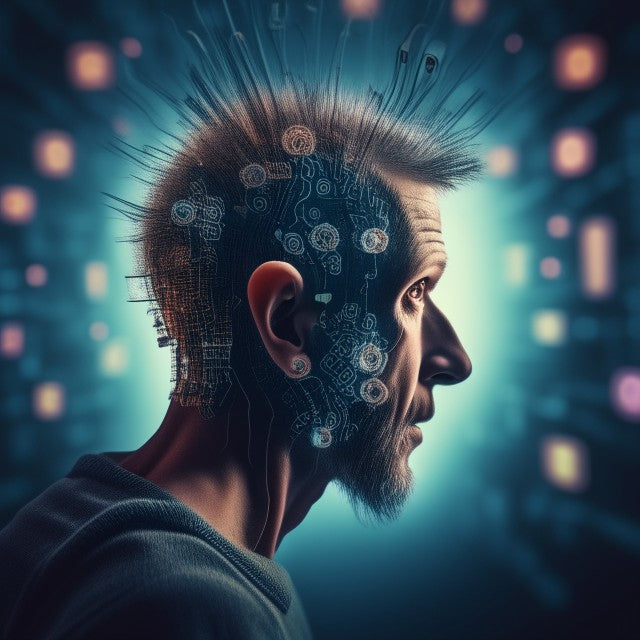In today's fast-paced digital age, the concept of an artificial intelligence (A.I.) therapist might sound like science fiction to some. However, the reality is that A.I. is making significant strides in the realm of mental health support. But how does A.I. therapy compare to traditional human therapy?
Over the past year, the intersection of artificial intelligence (AI) and therapy has garnered significant attention in the heathcare and tech sectors. Innovations in machine learning and natural language processing have enabled the development of AI-driven platforms designed to provide therapeutic support. These platforms are designed to understand, interpret, and respond to user inputs in a manner that mimics human therapists. The appeal lies in their accessibility, affordability, and the ability to provide immediate support, especially during times when human therapists might not be readily available. The ongoing global pandemic and economic recession has further underscored the need for remote and digital mental health solutions that can be available out on the road and in the moments when our more traditional institutions are unavailable. As research continues, there's a growing consensus that while AI can offer valuable support, it's most effective when used in conjunction with traditional human-led therapy.

Benefits of A.I. Therapy
- Accessibility: A.I. therapy app can be accessed anytime, anywhere, providing immediate support to those in need.
- Consistency: Unlike humans, A.I. doesn't have off days. It offers consistent responses every time
- Anonymity: Some individuals might feel more comfortable opening up to an A.I., knowing their secrets won't be judged or shared
- Data-Driven Insights: A.I. can analyze patterns in a user's behavior or speech to provide insights and recommendations tailored to their needs
- Cost-Effective: A.I. therapy can be more affordable than traditional therapy, making it accessible to a wider audience
Benefits of Human Therapy
- Empathy: A human therapist can provide genuine empathy, understanding, and validation that an A.I. cannot replicate
- Personal Touch: Personal anecdotes, shared experiences, and the human touch can make therapy sessions more relatable
- Adaptability: Human therapists can adapt their approach based on subtle cues, body language,and emotions
- Ethical Considerations: Human therapists are bound by ethical guidelines that ensure the well-being of their patients
- Holistic Approach: Humans can consider cultural, societal, and personal factors in therapy that A.I. might overlook
Mental health therapy is a specialized process designed to help individuals navigate emotional, psychological, or behavioral challenges, fostering well-being and improved functioning. Traditionally rooted in human interaction, therapy offers a safe space for introspection, growth, and healing. With the advent of technology, A.I. presents a transformative opportunity in this domain. It promises enhanced accessibility, personalized interventions, and data-driven insights, revolutionizing the therapeutic landscape. As we stand at this intersection of human expertise and technological innovation, the synergy between A.I. and human therapists emerges as a beacon of hope, ensuring comprehensive and adaptive mental health support for all.
Synergy Between A.I. and Human Therapists
- Supplemental Support: Imagine a world where you're never truly alone in your therapeutic journey. A.I. can serve as an on-demand companion, offering exercises, reminders, or immediate support during crises, bridging the gap between human therapy sessions
- Data-Driven Insights: What if your therapist had a deeper understanding of your mood patterns, triggers, and more? A.I. can gather this data, which, when shared with a human therapist, can lead to a more informed and personalized approach.
- Skill Development and Refinement: A.I. can offer skill-building exercises tailored to your needs. During human therapy sessions, these exercises can be discussed, refined, and integrated into your therapeutic plan.
- Continuous Accessibility: The world doesn't operate on a 9 to 5 schedule, and neither should your support system. For those moments outside of regular therapy hours, A.I. ensures you always have a resource at your fingertips.
In the vast realm of therapy, the integration of A.I. isn't about replacement but enhancement. It's about pushing boundaries, challenging norms, and asking ourselves: "What if there's a better way?" As we stand one the brink of a therapeutic revolution, we invite you to be a part of this transformative journey. Dive into a future where technology and humanity converge for holistic well-being.





Leave a comment
This site is protected by hCaptcha and the hCaptcha Privacy Policy and Terms of Service apply.